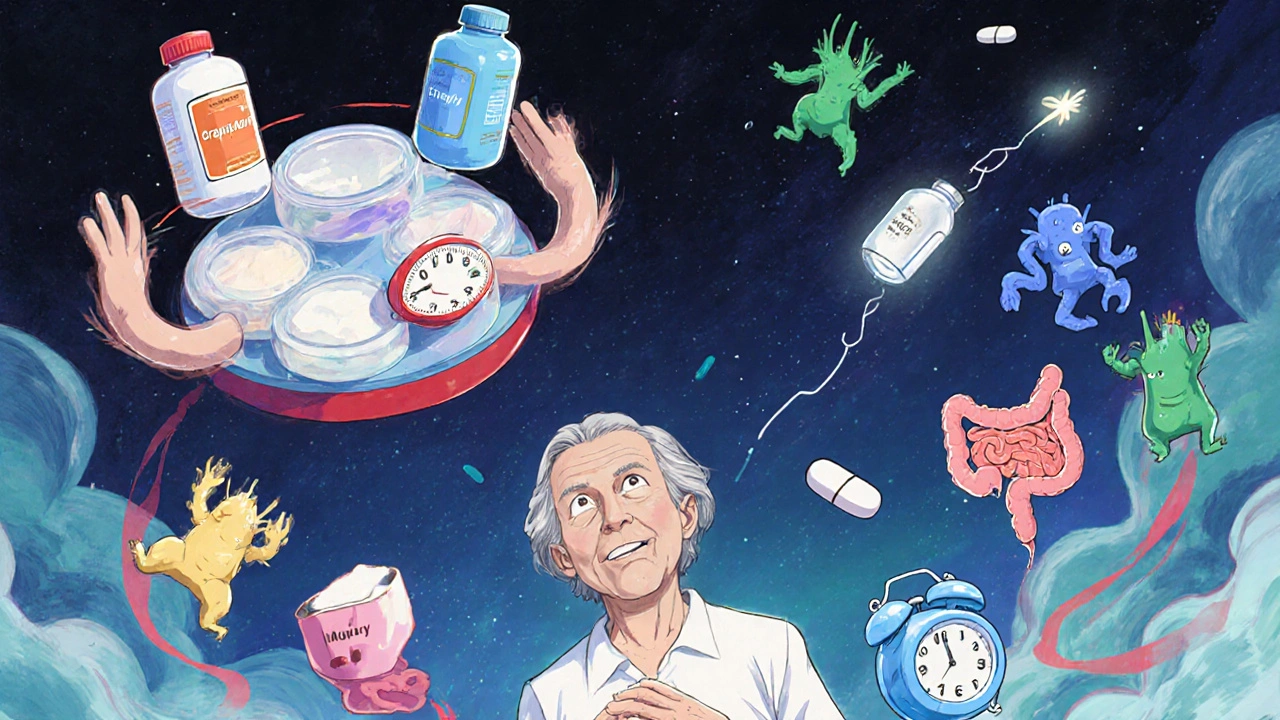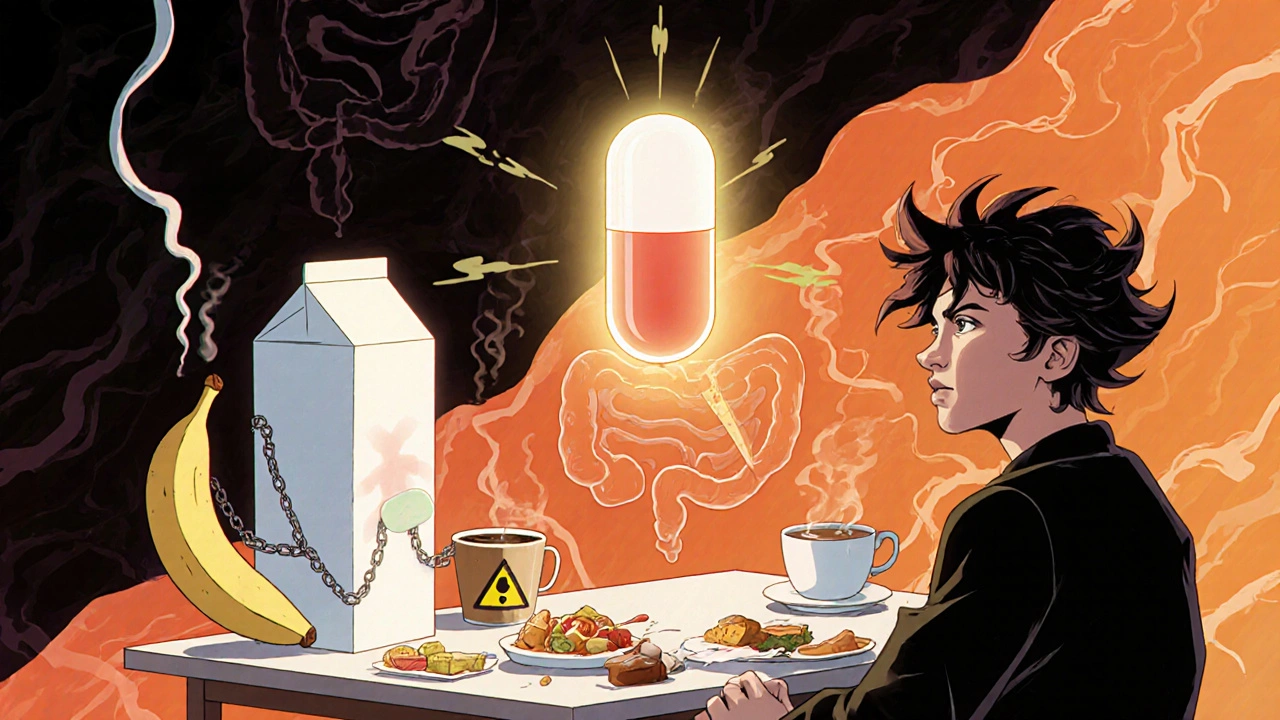Ever taken a pill and wondered if it really worked because you ate right after? Or maybe you skipped a meal to follow the label, but still felt off? You’re not alone. Around 35% of all prescription medications have specific instructions about food-yet most people don’t fully understand what those instructions mean. Taking a pill with or without food isn’t just about avoiding an upset stomach. It can make the difference between your medication working as it should or failing completely.
Why Food Changes How Medications Work
Your digestive system doesn’t just break down food-it changes how drugs get into your bloodstream. When you eat, your stomach slows down. Gastric emptying, the process that moves contents into the small intestine where most drugs are absorbed, can take 30 to 50% longer after a meal. That delay might not sound like much, but for some drugs, it means peak levels in your blood come hours later-or not at all. Food also changes the chemistry in your gut. Fats trigger bile release, which helps dissolve oily (lipophilic) drugs like griseofulvin or itraconazole. Without fat, these drugs barely get absorbed. On the flip side, calcium in dairy products binds tightly to antibiotics like tetracycline and doxycycline, blocking absorption by up to 75%. Even something as simple as a glass of milk can turn your antibiotic into a placebo. The FDA requires drug makers to test new medications with a standardized high-fat meal (800-1,000 calories, 50% fat) to see how food affects absorption. If the amount of drug in your blood changes by more than 20% compared to taking it on an empty stomach, the label must say so. That’s why you see instructions like “take with food” or “take on an empty stomach”-they’re not suggestions. They’re science-backed rules.When to Take Medications: Empty Stomach vs. With Food
There’s no one-size-fits-all rule. The timing depends entirely on the drug. Here’s how to break it down:- Take on an empty stomach: This means one hour before or two hours after eating. Medications like levothyroxine (for thyroid conditions) fall into this category. Food can cut absorption by 30-55%, leading to untreated hypothyroidism-fatigue, weight gain, depression-even if you’re taking the right dose. Same goes for bisphosphonates used for osteoporosis. If you take them with coffee, orange juice, or breakfast, they won’t work.
- Take with food: Some drugs need food to be absorbed at all. Nitrofurantoin (a urinary tract infection drug) sees a 40% increase in absorption when taken with meals. Cefpodoxime, another antibiotic, absorbs 50-60% better with food. For drugs that irritate your stomach-like ibuprofen or naproxen-food acts as a buffer. Studies show stomach pain drops from 42% to 12% when taken with food.
- Take 30 minutes before meals: This applies to drugs that need to hit your bloodstream fast before food slows things down. Glipizide, a diabetes pill, must be taken 30 minutes before eating. If you take it on an empty stomach, your blood sugar can crash below 70 mg/dL-a dangerous level that causes shaking, sweating, confusion, or even loss of consciousness. Semaglutide (Ozempic, Wegovy) also requires a 30-minute gap before eating. Take it too close to your meal, and you absorb 44% less of the drug.
Common Mistakes People Make
Most errors aren’t intentional. They’re misunderstandings. Here are the top three:- “With food” means a full meal. Not always. For some drugs, like certain HIV medications, a small snack of 200-300 calories is enough. A banana or a handful of crackers can do the job. But if you wait for a full breakfast, you delay absorption unnecessarily.
- “Empty stomach” means no coffee or juice. Coffee, orange juice, and even mineral water can interfere. Calcium in fortified juices, caffeine, and acids can bind to drugs or alter stomach pH. Stick to plain water when taking medications on an empty stomach.
- Taking pills with dairy. Milk, yogurt, cheese-anything with calcium-can wreck absorption of antibiotics, thyroid meds, and even some osteoporosis drugs. Even if you take your pill an hour before breakfast, if you drink milk with your toast, you’re still interfering.
One Reddit user shared how their recurrent UTI didn’t clear up until they stopped taking doxycycline with yogurt. Another person on Drugs.com said they felt fine on levothyroxine for years-until they realized they’d been taking it with their morning coffee. Their TSH levels normalized only after switching to water-only dosing.

Who’s at Highest Risk?
Not everyone is equally affected. Certain groups face much higher risks:- Elderly patients on 5+ medications: Polypharmacy increases interaction risk by 65%. A single misstep-like taking a blood pressure pill with grapefruit juice or a painkiller with milk-can cascade into serious side effects.
- People with digestive issues: Conditions like gastroparesis, Crohn’s, or celiac disease change how quickly food moves through the gut. Standard timing rules may not apply.
- Patients on narrow-therapeutic-index drugs: These are medications where the difference between a helpful dose and a toxic one is tiny. Think warfarin, digoxin, or levofloxacin. Even small changes in absorption can be dangerous.
Studies show that patients who get clear, personalized instructions from a pharmacist have 35% higher adherence at 90 days. That’s not just about remembering to take your pill-it’s about taking it right.
How to Get It Right Every Time
You don’t need to memorize every rule. Here’s how to make food-medication timing simple:- Ask your pharmacist. They’re trained to spot interactions. Don’t assume the label is enough. Ask: “Should I take this before, with, or after food? What foods should I avoid?”
- Use a pill organizer with alarms. Apps like Medisafe or MyTherapy let you set reminders for “take 30 min before breakfast” or “take with dinner.” Users who turn on food-timing alerts reduce timing errors by 27%.
- Keep a food-medication log. Write down what you ate and when you took your meds. If you feel off, you’ll know if it lines up with a meal.
- Be consistent. If you take your thyroid pill on an empty stomach, do it the same way every day-even on weekends. Inconsistency is why 18% of drug monitoring failures happen.
- Watch for new labels. Since 2020, the FDA requires clearer food-effect language on 92% of new drug labels. Look for phrases like “take at least 60 minutes before first meal” instead of vague terms like “take on an empty stomach.”

The Bigger Picture
Food-drug interactions aren’t just a minor inconvenience. They’re a major driver of healthcare costs. In the U.S., medication-related problems cost $528 billion annually. Food interactions alone contribute to 8% of that-roughly $42 billion. Most of that is preventable. As people age and take more medications, this problem will grow. By 2030, 55% of adults over 65 will be on five or more prescriptions. That means more chances for a simple mistake-like taking a pill with milk-to have serious consequences. New tech is helping. Ingestible sensors that track stomach pH and emptying speed are in early trials. One 2023 study showed 38% better absorption consistency when these sensors guided dosing timing. Future guidelines may even factor in your circadian rhythm-when your body naturally absorbs drugs best-on top of meal timing. But right now, the best tool you have is knowledge. Don’t guess. Don’t assume. Ask. Track. Be consistent. Your meds won’t work properly if you ignore the food around them.Can I take my medication with water instead of food?
Yes, water is the safest drink to take most medications with-especially if the label says “take on an empty stomach.” Avoid coffee, juice, milk, or alcohol, as they can interfere with absorption. Plain water doesn’t react with drugs and helps them move through your system without affecting how they work.
What if I forget and take my pill with food?
If you’re supposed to take it on an empty stomach and you ate, wait until your stomach is empty again-about two hours after eating-then take your dose. Don’t double up. If you’re supposed to take it with food and forgot, take it with a small snack right away. For most drugs, a slight delay won’t hurt, but for critical ones like levothyroxine or glipizide, timing matters a lot. Call your pharmacist if you’re unsure.
Why does grapefruit juice interact with so many drugs?
Grapefruit juice blocks an enzyme in your gut called CYP3A4, which normally breaks down many medications before they enter your bloodstream. When that enzyme is blocked, more of the drug gets absorbed-sometimes up to five times more. This can turn a safe dose into a toxic one. It affects statins, blood pressure meds, anti-anxiety drugs, and more. Even one glass can have effects lasting 24 hours.
Are over-the-counter pills affected by food too?
Yes. Even common OTC drugs like ibuprofen, aspirin, or antacids can be affected. Ibuprofen is easier on your stomach with food. Antacids can block absorption of antibiotics like tetracycline. Always read the label-even for pills you think are harmless.
Does it matter what time of day I take my meds with food?
For food interactions, the time of day matters less than consistency. What matters is whether you take the pill with or without food relative to your meals. But for some drugs, like corticosteroids or blood pressure meds, time of day affects your body’s natural rhythms. Always follow your doctor’s instructions on timing-it could be about both food and circadian rhythm.
What to Do Next
Start today. Grab your medication list-prescriptions, supplements, even OTCs. For each one, ask:- Does the label say “with food,” “without food,” or “before meals”?
- What counts as “food”? A full meal? A snack? A glass of milk?
- Am I consistently following this rule-or am I making excuses?
If you’re unsure, call your pharmacy. Pharmacists have access to detailed interaction databases and can give you exact guidance. Don’t wait for a side effect to happen. Prevent it before it starts.
Your body doesn’t treat pills the same way it treats food. But it responds to both-and getting the timing right isn’t just helpful. It’s essential.

